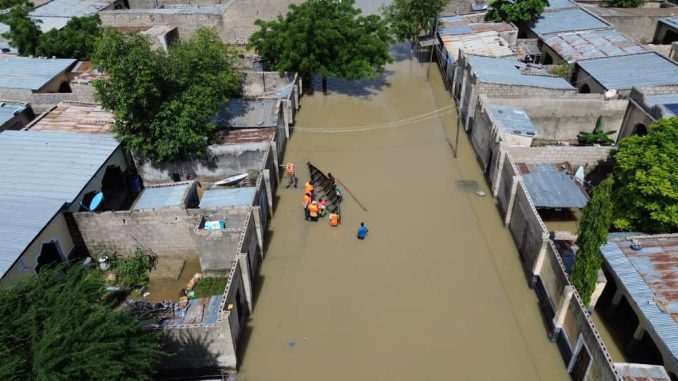The recent collapse of Alau Dam in Borno and the attendant devastating consequences resulting in loss of lives, destruction of farmlands and hundreds of homes in Maiduguri, the state capital, shows the perceptible aloofness of government at all levels in finding lasting solutions to flood related issues in the country. ...Tap To Read The Full Story Here | ..Tap To Read The Full Story Here...
1.2.2. SEE. VIDEO: MAN. KILLED. MOTHER. FOR .RITUALS
Since the challenge of floods started under the administration of former President Goodluck Jonathan in 2012, successive incidents of the natural disaster have left destruction and death in its path with indelible impact on the lives of the victims.
This latest occurrence, nonetheless, captures succinctly the well worn refrain that he who fails to plan, plan to fail, given the fact that the actions and inactions of government have not gone beyond the usual rhetoric before and after it occurs.
This newspaper is aware that the Alau Dam, built in the 1980s and which supports irrigation and supplies potable water to Maiduguri and Jere local government area, before its eventual collapse, had been showing signs of stress. Typical of the authorities attitude against maintenance culture, scant attention was paid to it until it packed up.
Tinubu Sympathises With Victims Of Borno Flood Disaster
The flooding of the communities was said to have begun about a week before the floodgate which reached its peak last week displacing residents of Fori, Galtimari, Gwange, Bulabulin, and other communities.
In the aftermath of the incident, thousands of homes were submerged, including the palace of the Shehu of Borno and government facilities in the capital.
There was also a jailbreak during which hardened criminals made their escape and animals too in the Museum Park. This is further endangering the lives and wellbeing of hapless residents, including reports that 80 percent of animals at the Sanda Kyarimi Park Zoo died as a result of the collapse of the 34 year-old dam.
We are persuaded to argue that the collapse of the dam was completely avoidable if the governments were awake and alive to their responsibilities.
For a fact, we recognise the role of the federal government’s organs, Nigeria Meteorological Agency (NIMET) and the Nigeria Hydrological Services Agency ( NIHSA), in the prediction of floods, which is usually followed by warnings to Nigerians to vacate flood prone areas. But the government has failed to do its own part by ensuring that all probable leaks from dams are taken care of before they cause problems.
The government cannot continue to play the ostrich when the issue of life of its citizenry is at stake. Flood related issues have become much like a recurring decimal, disasters waiting to happen.
We know that a dam does not just collapse in a day without notice, and with the intense rains, a proactive management would have known that waters must be released gradually from the dam to avoid a breach, but in this case, the waters had reached the crescendo before the management of the dam raised the alarm.
This is even as the North East Development Commission (NEDC) attributed the collapse to weak structures and siltation of the water facility.
The country has over 340 dams spread across different geo-political zones, under the management of the three government tiers and many are not optimally utilised or are at risk of damage.
The rehabilitation of the dam and other similar projects are part of the duties of the Chad Basin River Development Authority ( CBRDA) with the Federal Ministry of Water Resources serving as the supervisory body.
Document on the Open Treasury Portal show that about N300 million had supposedly been spent on rehabilitating the dam between 2018 and 2024 and a major part of this was spent in 2023 when the CBRDA awarded N162 million to contractors for repairs.
We are worried over the approach of the federal agencies and state governments which collect huge sums of money from Ecological Funds yearly without evidence of judicious utilization that would have addressed perennial floods that lead to avoidable catastrophic incidents like this.
As in every mishap, the nation’s emergency management agencies struggle to share palliatives when such disasters would have been prevented in the first place.
In our opinion, this incident should not be swept under the carpet as business as usual but an investigation should be carried out on the utilisation of the money budgeted for the rehabilitation of the collapsed dam.
According to Govspend website of the current administration, the sum of N171 million was recorded spent by the federal government on the rehabilitation of the collapsed Alau Dam and payments were made between June 2023 when the administration came on board and July 2024, while the last tranche of money recorded spent was N26 million disbursed on July 29, 2024, just a little over a month to the collapse, for rehabilitation works at the dam.
1.3.4. POPULAR. ACTRESS. SECRET. VIDEO. LEAKED. OUT. GOES VIRAL
We urge other states to take a cue from the incident and put in place proactive measures to avoid similar occurrences.▶For More READ THE FULL STORY▶▶



